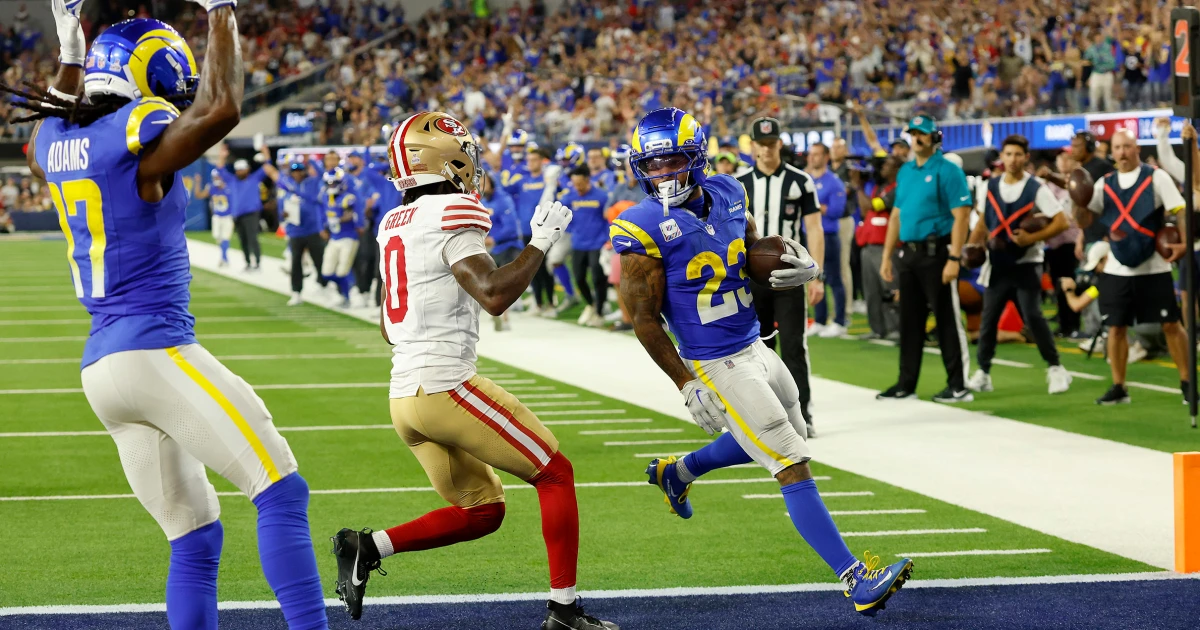
If you somehow missed the first four weeks of the NFL season but wanted to feel caught up, all you had to do was tune in Thursday.
The night became a microcosm for the previous month.
San Francisco held on in overtime to beat the Los Angeles Rams, 26-23, in the season’s 65th game — an outcome that was influenced by the same trends that emerged from the first 64.
Blocked kicks? Including blocked punts, September produced 16 of them, the second-most through Week 4 since at least 1991, per an Associated Press analysis. That included 12 blocked field goals or point-after attempts that flipped wins from losses, and vice versa. The most memorable was Philadelphia’s last-second block of Rams kicker Joshua Karty that the Eagles returned for a touchdown as time expired on Sept. 21.
Thursday saw yet another, when a Karty point-after that would have put the Rams ahead, 21-20, early in the fourth quarter was stuffed by San Francisco to keep the score tied. In a game where both teams would later add a field goal apiece and go into overtime, every point was necessary, the block becoming a butterfly effect for the rest of the night.
About nine minutes later, with just over one minute remaining in regulation, the Rams were in prime position to take the lead again. Then, Rams running back Kyren Williams fumbled on his way to the end zone, the ball literally punched out just feet away from scoring a go-ahead touchdown.
It was undoubtedly one of the game’s most consequential plays. Yet there were only two turnovers combined on the night, a relatively clean game overall, and one that fell in line with the rest of the season.
Entering Thursday night, all 32 teams had combined for just 143 turnovers, the fewest through Week 4 of a season since 1999, according to NBC Sports research. All those saved possessions have helped teams score an offensive touchdown on 40 percent of their drives, the highest percentage since the metric began being tracked by Pro Football Reference in 1998. Teams entered Week 5 scoring the highest average points per drive since 2020, and second-highest mark since tracking began in 1998.
Yet the Rams would get zero points out of their last possession. In overtime, trailing by three after San Francisco kicked a field goal to open the extra period, the Rams faced fourth down and needed one yard to extend their drive. Instead of kicking a field goal that could have given the 49ers the ball back with more than three minutes still remaining, Rams coach Sean McVay called a run to extend their drive and go for a win.
The resulting run was short, and the 49ers bounded onto the field to celebrate a win that seemed to underscore the notion that one month in, it’s no easier to pick who could emerge from the parity-filled NFC, even with reigning Super Bowl champion Philadelphia undefeated at 4-0.
Fans could be excused if the finish felt like déjà vu. After all, there have been more late, game-deciding plays than ever. That’s not hyperbole. Eighteen games were decided by a game-winning score in either the final three minutes of regulation or overtime through Week 4, the most in any season in NFL history according to NBC Sports research. Thursday was just example No. 19.
And San Francisco would not have pulled it off if not for the play of a quarterback who entered the season second-string. Mac Jones threw for 342 yards and two touchdowns without an interception and took just one sack despite playing on a hobbled left leg that required medical attention at multiple points Thursday night.
Jones was only playing because Brock Purdy, the quarterback signed to a $265 million contract in the offseason, had been hurt in the season opener, and in the process joined a rash of big names sidelined by injury — from Cincinnati’s Joe Burrow, to the Giants’ Malik Nabers, to potentially two-time MVP Lamar Jackson in Baltimore, as well.
Jones has been the league’s best backup while going 3-0 to lead perhaps the most unlikely 4-1 team in the NFL — the team’s best five-game start since 2021 — given the attrition that has whittled away the depth across San Francisco’s roster. But Jones is far from the only backup QB called to start. Only two weeks into the season, backups were being pressed into duty because of injury in Washington, Minnesota, Cincinnati and the Jets, too. Another is taking over this weekend in Cleveland, as former backup Dillon Gabriel, a rookie, will supplant veteran Joe Flacco as the starter.
What might Gabriel expect in his first NFL start? If the first month was any indication, a close, low-turnover game decided by a blocked kick might be in the cards — especially because Cleveland has already won a game just like that.



